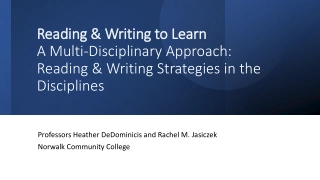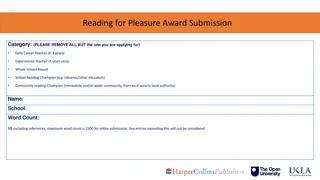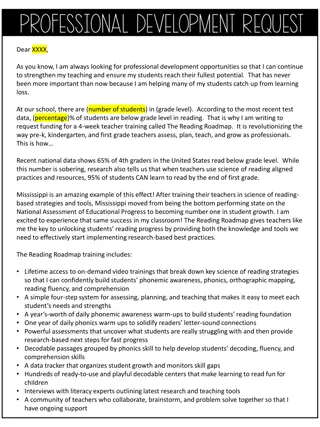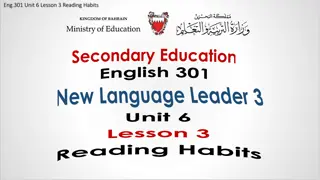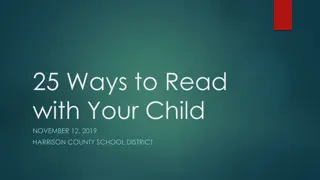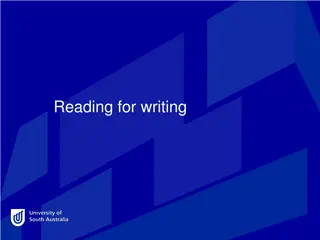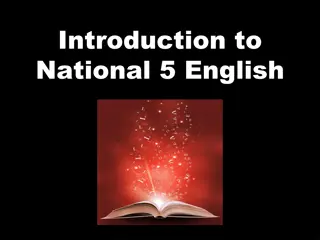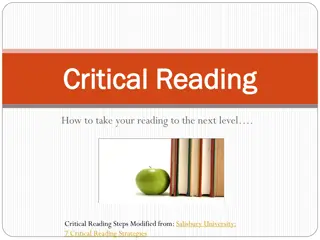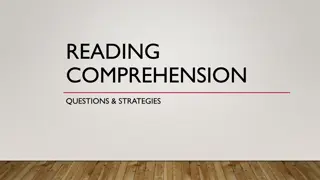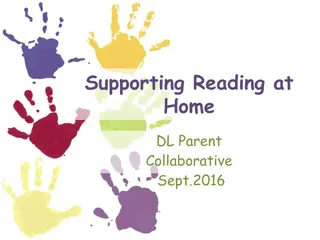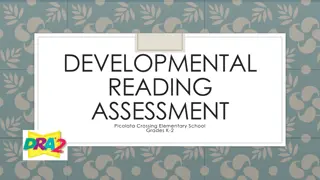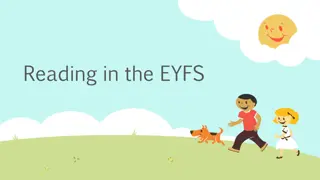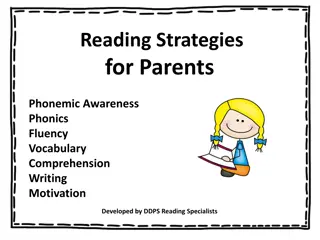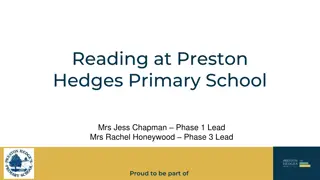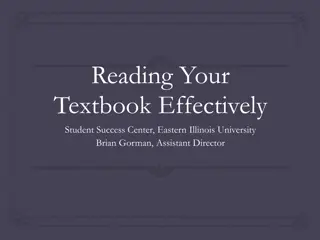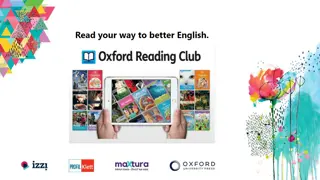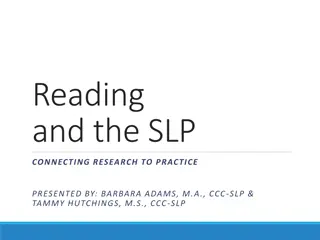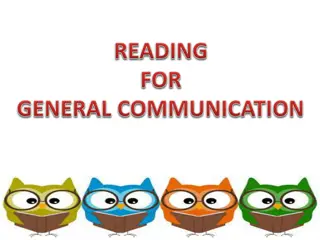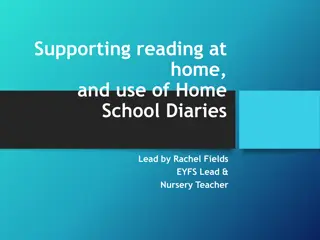Enhancing Critical Reading Skills in College: Guidelines and Strategies
Develop your critical reading skills in college by moving beyond simple comprehension to active analysis and critique. Learn how to engage with texts, form independent opinions, and express your views effectively. Practice close reading, challenge conventional interpretations, and think for yourself to excel in any major.
Download Presentation

Please find below an Image/Link to download the presentation.
The content on the website is provided AS IS for your information and personal use only. It may not be sold, licensed, or shared on other websites without obtaining consent from the author. Download presentation by click this link. If you encounter any issues during the download, it is possible that the publisher has removed the file from their server.
E N D
Presentation Transcript
Critical Reading Strategies Richard Barakat English Professor, EPCC
Critical Reading: The main difference between high school and college In high school we read for comprehension, learning what the essay is about. (Even the SAT and ACT tests focus on comprehension.) In college we must read actively as critics to understand the text as an expression of an idea or ideas. These ideas can be complex and controversial. These ideas are the opinion of the author. Therefore, the essay is open to question and debate. The student is now a critic.
I like it or I dont like it is not enough Anyone has the right to express his or her personal opinion about an essay: Students can say I like this essay or I don t like this essay. Often, they can give no reason at all. But in college we must rise to a higher level of reading as critics, determining how that essay is written, what makes it work or not, what it means, and if that meaning can be questioned and debated. Students must be able to articulate their views in classroom discussions and in writing critical responses.
Even if you are not an English major The practice of critical thinking in reading an essay and it does take practice is a necessary tool that you can use for any college course and any major. The reading skills, analytical skills, and the ability to form reasonable opinions and conclusions about a given text will help you in a business or biology class as much as in an English, history, politics, psychology, or philosophy class.
Basic guidelines for critical reading in college-level work Close reading is reading slowly and paying close attention to the meaning of each sentence and looking up any words you don t know. Study closely how the writer uses language to convey meaning to determine what that meaning is. Engage actively as you read the essay by making notes and highlighting key passages. Ask questions of the essay. Challenge it, if necessary.
Guidelines continued Do not rely on the opinions of other people or on conventions the accepted interpretations of a text. Too often we simply follow the opinions of others and follow blindly the conventions. Think for yourself and ground your opinion in your own analysis of the essay. College-level work is about exploring for yourself and expressing your own independent thought in a reasonable and logical way. Reread the essay. Once is not enough! An English class isn t a Math class. There may be more than one answer or no answer!
Critical Reading: The Teachers Role and the Socratic Method I have my class read the essay together We read the essay slowly and carefully I define words that some or all students may not know I use the Socratic method of question-and-answer to identify and discuss ideas as they occur in the essay I draw the students attention to the author s writing style I have students write a short response to the essay and read them to the class for open discussion
Teaching Strategy: Helping Students to ask questions on what they read Asking questions on an essay (or any text) is a key to interpreting it, such as - What is the perspective of the author? How does the author use language to convey meaning? - What is the historical and cultural context of the essay? - What is your analysis of the characters and their relationship to each other? - What are the main ideas of the essay? These questions can be drilled down in class discussions and in written responses.
Teaching Strategy: Asking Students One Big Question Asking One Big Question to students can really help them to think critically about what they read. For example: - Which sentence is the most interesting in this essay? Why? - What is wrong with this essay? - Is the writer of this essay good or not? Why? - One year from now, would you read this essay again on your own? Why? Students write their responses and then present them to the class for discussion
Essay Example: Genre is Disappearing. What Comes Next? Amanda Petrusich This essay provides rich opportunity for stimulating critical thinking in students Questions that you can ask: 1. The Webster dictionary defines genre as a category of artistic, musical, or literary composition characterized by a particular style, form, or content. Does Amanda Petrusich see genre in the pop music industry like Webster defines it? Why? 2. What is Amanda Petrusich s background and does it influence her perspective in this essay?
Genre is Disappearing. What Comes Next? continued 3. Petrusich interviews several people in this essay. Choose one interviewee that you agree with or one that you disagree with. Explain why. 4. Choose one of the author s points that you agree with. Explain why. 5. What is the cultural context of this essay? Does it still relate to music today? 6. What is the main idea of this essay? Do you agree or disagree with it? Why? 7. Petrusich mentions many music artists and bands in this essay. Let s say that you are a music critic. Do you agree with her choices? Are there others you would choose to support or contradict her argument?
Genre is Disappearing. What Comes Next? continued 8. On page 2, the author argues: Taste is still a way of broadcasting a social identity and indulging in a kind of instinctive tribalism, but the boundaries are no longer quite so circumscribed. What does she mean by this? Do you agree or not? Why? [Note: The students have to look up the words themselves and come to their own understanding of the author] 9. On page 2, the author states: Popular music has always been the result of various traditions intermingling. Do you think that this is true or is it a generalization that may or may not be true? Explain why.
Genre is Disappearing. What Comes Next? Conclusion 10. The author ends her essay stating: It s interesting to consider genre as inherently backward-looking particularly in a moment, such as this one, in which we are all hungrier than ever for the future. Do you think that this is a strong ending or not? Why?
Critical Reading and Critical Thinking: Final Thoughts I don t use group work for exercises in critical thinking. I focus on the students as individuals. For essays, such as the one I used as an example, that offer opportunities for using media like music or movies, I will play bits of the music or the movies to the class so that they can hear and see for themselves. We often don t know what we think about a subject until we are asked, so it s important that the teacher actively engages the class with questions and discussion.


